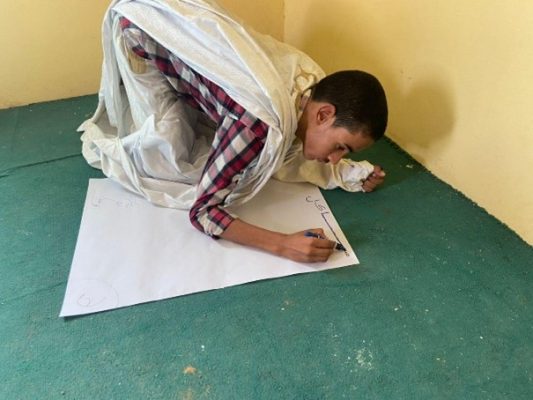 Youth entrepreneurs in recent CIPE training sessions in Mauritania generated 45 new business ideas, 32 of which secured funding from Mercy Corps and start-up assistance from CIPE. The sessions, held in three villages in late 2023, attracted 175 people under the age of 25, providing an example of the challenge and the opportunities of sub-Saharan Africa’s demographic dividend.
Youth entrepreneurs in recent CIPE training sessions in Mauritania generated 45 new business ideas, 32 of which secured funding from Mercy Corps and start-up assistance from CIPE. The sessions, held in three villages in late 2023, attracted 175 people under the age of 25, providing an example of the challenge and the opportunities of sub-Saharan Africa’s demographic dividend.
About 64.5 percent of sub-Saharan Africa’s population is younger than 25, which makes this age cohort a strategic development priority. A well-trained generation of young people could serve as a dynamic and innovative labor force, representing an asset for economic growth in the region. However, current conditions feature high youth unemployment rates and poor education and training outcomes, including illiteracy and high dropout rates. Governments and international development partners promote entrepreneurship to create viable opportunities for youth participation, and this is a trial-and-error process that has produced modest results and valuable lessons.
CIPE’s Sahel team developed specific approaches and tools for vulnerable youth groups, especially those in rural areas. CIPE uses a demand-driven model for local development that views youth as a constructive community resource. This model features a triangular linkage among youth, opportunity, and territory, and a logistical integration process that supports the enabling environment and individual ecosystem stakeholders.
Using such an approach, CIPE designed and implemented an economic inclusion component for a project funded by the U.S. Agency for International Development in Hodh Charghi and Hodh Gharbi, two regions of eastern Mauritania that border Mali. That country faces serious security challenges due to terrorism and criminal activity, and its government controls about half of its territory. In part because of these challenges in Mali, Mauritania’s government has made socio-economic inclusion a top priority.
The CIPE Sahel team set up the project through a consultative process with local communities to identify challenges and map the youth pool. Under the leadership of traditional and official leaders, including local elected representatives and in alignment with regional development plans, CIPE organized entrepreneurship training sessions to ignite youth creativity and support them in developing solutions to solve local problems through business creation. The sessions built entrepreneurship capacity for over 175 youth in three pilot villages. By the end of the process, around 45 business ideas emerged, of which 32 were incubated by CIPE and funded by Mercy Corps.
 CIPE’s approach also included improving the enabling environment through an inclusive dialogue process, by consulting local adult leaders, and conducting communication activities to link various stakeholders with new businesses, including development partners, public agencies, service providers, and financial institutions. CIPE also trained local youth associations on entrepreneurship management and financial literacy by transferring expertise and providing mentoring, so that local entrepreneurs can continue to benefit from incubation support and similar projects easily duplicated in the future.
CIPE’s approach also included improving the enabling environment through an inclusive dialogue process, by consulting local adult leaders, and conducting communication activities to link various stakeholders with new businesses, including development partners, public agencies, service providers, and financial institutions. CIPE also trained local youth associations on entrepreneurship management and financial literacy by transferring expertise and providing mentoring, so that local entrepreneurs can continue to benefit from incubation support and similar projects easily duplicated in the future.
“The CIPE initiative was impactful because they did not come to do something for us but to help us do something for ourselves. What our kids have gotten is not just important for them as a job but for us as a community given that they are solving our food, water and transport problems.”
– Mohamed Lemine Abeidy, Mayor of Dwerare Village
CIPE also aimed to attract women for training sessions, which is typically challenging in conservative religious environments in rural areas. To achieve this, the project team implemented activities in the villages with family participation and provided basic childcare for young mothers who wanted to participate. Over 50 percent of the 175 final beneficiaries were young women, often mothers who dropped out of school or never attended one. The average age of the participants was 20.
 While an initial evaluation by CIPE showed high satisfaction among local communities and youth entrepreneurs’ activities still ongoing, further impact evaluations will test the effectiveness of these innovations in support of young entrepreneurs. This monitoring will not only help development partners and the Mauritanian government design and deliver future interventions more successfully; it will also strengthen the global understanding of the key constraints faced by young entrepreneurs and highlight innovative and sustainable solutions.
While an initial evaluation by CIPE showed high satisfaction among local communities and youth entrepreneurs’ activities still ongoing, further impact evaluations will test the effectiveness of these innovations in support of young entrepreneurs. This monitoring will not only help development partners and the Mauritanian government design and deliver future interventions more successfully; it will also strengthen the global understanding of the key constraints faced by young entrepreneurs and highlight innovative and sustainable solutions.
Published Date: June 24, 2024
